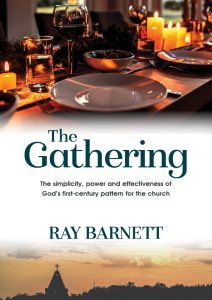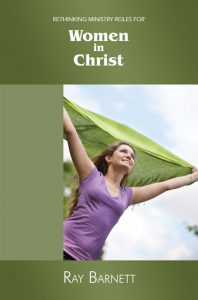Rethinking the ministry roles of women in Christ
Does the Bible really say that women should remain silent?
Must all women silently submit to all men?
Arguments based on words and phrases abound. However, a subject as significant as the silencing of fifty percent of all believers for all time needs a far stronger foundation than a finely tuned argument based on one or two verses. The discussion needs to begin with the Gospel.
In particular, it needs to address the serious question of why it is that men can be free from every stain of Adam’s sin and yet Christ apparently cannot free women from Eve’s deception or sin.
Women In Christ has the Gospel at its foundation. It re-examines the Biblical texts and the various arguments with the one core issue in mind: What does redemption mean for women?
The night the rules were broken...
It was a large, conservative evangelical church. Women neither preached nor shared from behind the ornate, elevated pulpit. The carved chairs behind the communion table were reserved for men alone. It had always been this way. To act any differently would be an affront to the Word of God and the created order.
But one Sunday evening, a small woman mounted the steps and stood behind the pulpit. The pastor and deacons retreated and sat humbly as she began to speak.
For two hours she taught, challenged, rebuked and inspired the men and women who packed the auditorium to overflowing. And when she had finished, men and women walked out into the night, changed forever. Some became missionaries. Some entered theological training. Many, for the first time ever, began to understand what it really meant to trust and follow Christ.
READ MOREWhat on earth went wrong? Had these most conservative of church leaders suddenly become feminists? Or liberals? Had they inexplicably denied the authority of Scripture for one night?
Or were they were compelled to admit that, beyond anything they had ever thought, taught or demanded, God had torn apart the foundations of their masculine superiority by the undeniable reality of what he had done in his kingdom through the preaching and teaching of this one, small woman?
More later, but first...
Why is it an issue?
It’s in the Bible!
I do not permit a woman to teach or have authority over a man. (1 Timothy 2:12)
There you have it — a plain, unambiguous statement in black and white.
Or is it?
Why is that when Scripture seems to speak so plainly, there can be men and women who fully respect the authority of God’s word and yet who champion the cause of women using their teaching gifts as freely as men? Are they trying to get around something they don’t like? Are they just “women’s libbers” or “feminists”? Or are they seeing things that might not be as visible on the surface of our English translations as our inherited perspectives suggest?
For example, it is interesting to note that the words “woman” and “man” in that English translation of 1 Timothy 2:12 (above) are Greek words commonly translated as “wife” and “husband” throughout the New Testament…over 50 times.
Paul himself uses those exact same Greek words in Ephesians 5, where he says, “Husbands love your wives… Wives submit yourselves to your husbands…” And there is probably not an evangelical Christian among us who would imagine those words to mean anything other than husband and wife. Any other translation just wouldn’t work. Nor would it in 1 Peter 3:1-7 when Peter tells believing wives how to win their unsaved husbands, and husbands how to live considerately with their wives.
Later, in the letter of 1 Timothy, Paul instructs Timothy that an overseer (church leader) must be “the husband of one wife”. Here again, exactly the same Greek words. And in that place, who among us would imagine them to mean anything but “husband” and “wife”?
A serious possibility
Therefore, is it possible that in 1 Timothy 2:12 Paul wasn’t talking about preaching or church leadership at all, but was talking about relationships within families? Might it be possible that what Paul said to Timothy in 1 Timothy 2:12 was simply a statement in keeping with what he said to the Ephesians and Colossians concerning the roles of husbands and wives within the family?
Yes, it is very definitely possible. And it is possible without any interpretative gymnastics or strained attempts to “get around” what seems (in English) to be so plain and simple.
So how do we decide whether the words should be translated “man and woman” or “husband and wife”? Where a genuine choice of translation is possible, how do translators decide which words to choose?
The real questions is: What did Timothy himself understand?
Clearly we will need to come back to 1 Timothy 2 and think seriously about the text, but before we do, there is a wide range of background issues we need to think about. The first and most foundational of all will be the affect of the Gospel on women.
COLLAPSE





